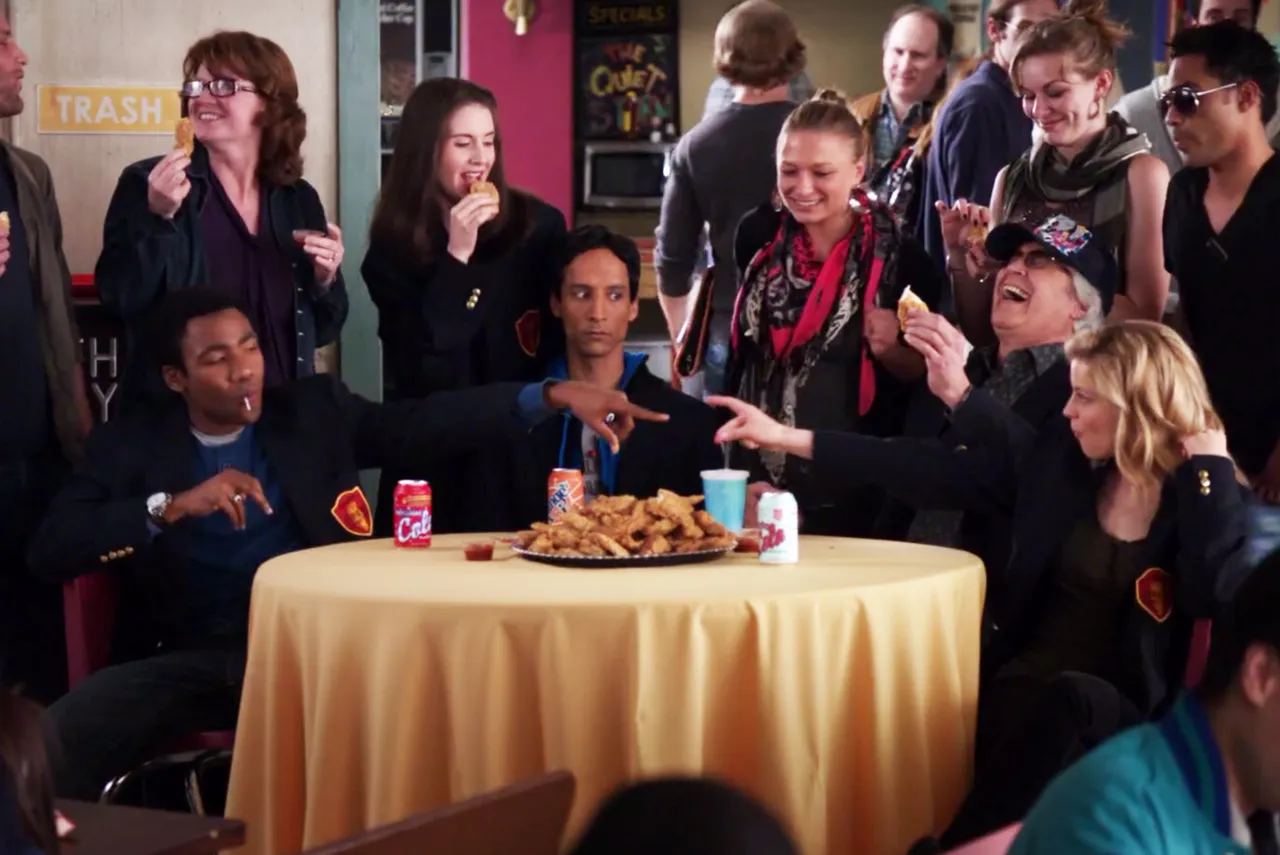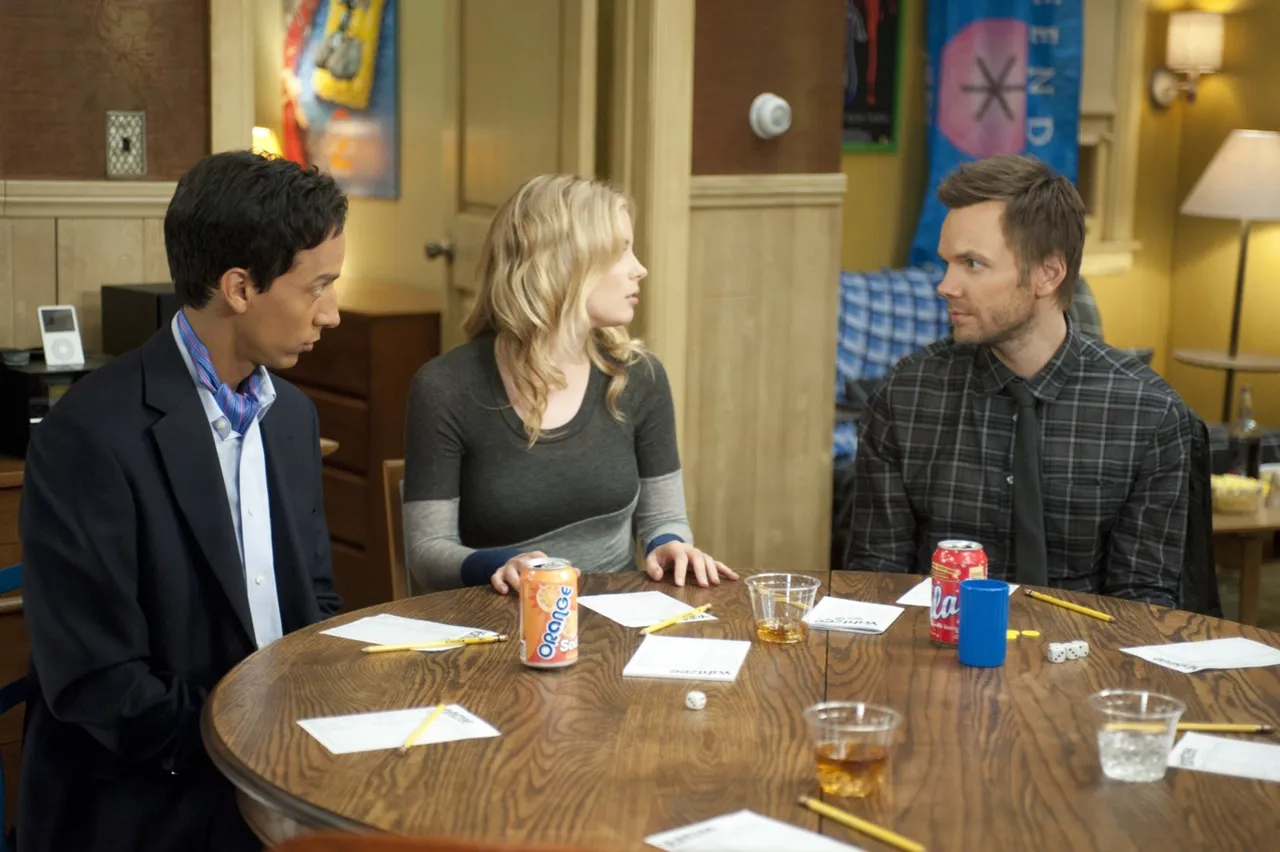If you prefer the English version, click on the following link 👉 HERE
La lechuga en una parodia
En muchos países pobres, “sacrificar la lechuga” tiene sentido. Y es que el hambre azota a muchas regiones. Pero en otro contexto, la frase es icónica de la cultura pop moderna, originada en la serie Community. Su significado está ligado a la parodia, el absurdo y el amor de los fans por un momento inolvidable de la televisión.

ESPINOF
Dentro del universo de Community, la frase emerge en un momento de histeria controlada, durante el célebre episodio “Cooperative Calligraphy”. El grupo de estudio se encuentra encerrado voluntariamente en su sala, negándose a salir hasta que aparezca el bolígrafo desaparecido de Annie. La tensión, aunque ridícula, es palpable y cada personaje reacciona de una manera distinta al claustrofóbico drama que ellos mismos han creado. La paranoia se apodera del grupo, convirtiendo una nimiedad en una crisis de confianza.
En medio de las acusaciones y la creciente frustración, Britta Perry, siempre pragmática y ahora simplemente hambrienta, expresa una queja completamente terrenal que rompe momentáneamente el falso dramatismo.
Britta Perry: “Okay, look, I’m getting a little hungry.”
Es en este instante cuando Abed Nadir, quien procesa la realidad a través de la lente de los tropos televisivos, ve la oportunidad perfecta para elevar el drama a un nivel superior. Con una seriedad imperturbable, como si estuviera en el clímax de una película de supervivencia, ofrece su solemne solución:
Abed Nadir: “We’ll have to sacrifice the lettuce.”
La genialidad del momento reside en que Abed no sugiere comer la lechuga para calmar el hambre de Britta. Su entrega, grave y ceremoniosa, la enmarca como una ofrenda ritual, un sacrificio sin sentido para apaciguar a los “dioses del guion” y añadir peso a su autoconsciente “episodio botella”. Es la respuesta más absurda posible, no a la necesidad física, sino a la necesidad narrativa que él percibe.
Es un excelente ejemplo de cómo la cultura pop crea su propio lenguaje.
En muchos países pobres, “sacrificar la lechuga” tiene sentido. Y es que el hambre azota a muchas regiones. Pero en otro contexto, la frase es icónica de la cultura pop moderna, originada en la serie Community. Su significado está ligado a la parodia, el absurdo y el amor de los fans por un momento inolvidable de la televisión.

ESPINOF
Dentro del universo de Community, la frase emerge en un momento de histeria controlada, durante el célebre episodio “Cooperative Calligraphy”. El grupo de estudio se encuentra encerrado voluntariamente en su sala, negándose a salir hasta que aparezca el bolígrafo desaparecido de Annie. La tensión, aunque ridícula, es palpable y cada personaje reacciona de una manera distinta al claustrofóbico drama que ellos mismos han creado. La paranoia se apodera del grupo, convirtiendo una nimiedad en una crisis de confianza.
En medio de las acusaciones y la creciente frustración, Britta Perry, siempre pragmática y ahora simplemente hambrienta, expresa una queja completamente terrenal que rompe momentáneamente el falso dramatismo.
Britta Perry: “Okay, look, I’m getting a little hungry.”
Es en este instante cuando Abed Nadir, quien procesa la realidad a través de la lente de los tropos televisivos, ve la oportunidad perfecta para elevar el drama a un nivel superior. Con una seriedad imperturbable, como si estuviera en el clímax de una película de supervivencia, ofrece su solemne solución:
Abed Nadir: “We’ll have to sacrifice the lettuce.”
La genialidad del momento reside en que Abed no sugiere comer la lechuga para calmar el hambre de Britta. Su entrega, grave y ceremoniosa, la enmarca como una ofrenda ritual, un sacrificio sin sentido para apaciguar a los “dioses del guion” y añadir peso a su autoconsciente “episodio botella”. Es la respuesta más absurda posible, no a la necesidad física, sino a la necesidad narrativa que él percibe.
Es un excelente ejemplo de cómo la cultura pop crea su propio lenguaje.
Ven y participa, aún estás a tiempo. Toda la información la podrás encontrar cada día en la Comunidad #Freewritehouse. Específicamente, el día de hoy, aquí la publicación del prompt:
«¡sacrificar la lechuga!»

Portada de la iniciativa.

Dedicado a todos aquellos que, día a día, con su arte, hacen del mundo un lugar mejor.


Lettuce in a parody
In many poor countries, “sacrificing lettuce” makes sense. Hunger plagues many regions. But in another context, the phrase is iconic in modern pop culture, originating in the series Community. Its meaning is linked to parody, absurdity, and fans' love for an unforgettable television moment.

ESPINOF
Within the Community universe, the phrase emerges in a moment of controlled hysteria, during the famous episode “Cooperative Calligraphy.” The study group is voluntarily locked in their living room, refusing to leave until Annie's missing pen is found. The tension, though ridiculous, is palpable, and each character reacts differently to the claustrophobic drama they themselves have created. Paranoia takes hold of the group, turning a trivial matter into a crisis of confidence.
Amidst the accusations and mounting frustration, Britta Perry, always pragmatic and now simply hungry, voices a completely earthly complaint that momentarily breaks the false drama.
Britta Perry: “Okay, look, I’m getting a little hungry.”
It’s at this moment that Abed Nadir, who processes reality through the lens of television tropes, sees the perfect opportunity to elevate the drama to the next level. With imperturbable seriousness, as if at the climax of a survival film, he offers his solemn solution:
Abed Nadir: “We’ll have to sacrifice the lettuce.”
The genius of the moment lies in the fact that Abed doesn’t suggest eating the lettuce to appease Britta’s hunger. His grave and ceremonious delivery frames it as a ritual offering, a meaningless sacrifice to appease the “script gods” and add weight to his self-conscious “bottle episode.” It’s the most absurd response possible, not to physical need, but to the narrative need he perceives.
It’s an excellent example of how pop culture creates its own language.
In many poor countries, “sacrificing lettuce” makes sense. Hunger plagues many regions. But in another context, the phrase is iconic in modern pop culture, originating in the series Community. Its meaning is linked to parody, absurdity, and fans' love for an unforgettable television moment.

ESPINOF
Within the Community universe, the phrase emerges in a moment of controlled hysteria, during the famous episode “Cooperative Calligraphy.” The study group is voluntarily locked in their living room, refusing to leave until Annie's missing pen is found. The tension, though ridiculous, is palpable, and each character reacts differently to the claustrophobic drama they themselves have created. Paranoia takes hold of the group, turning a trivial matter into a crisis of confidence.
Amidst the accusations and mounting frustration, Britta Perry, always pragmatic and now simply hungry, voices a completely earthly complaint that momentarily breaks the false drama.
Britta Perry: “Okay, look, I’m getting a little hungry.”
It’s at this moment that Abed Nadir, who processes reality through the lens of television tropes, sees the perfect opportunity to elevate the drama to the next level. With imperturbable seriousness, as if at the climax of a survival film, he offers his solemn solution:
Abed Nadir: “We’ll have to sacrifice the lettuce.”
The genius of the moment lies in the fact that Abed doesn’t suggest eating the lettuce to appease Britta’s hunger. His grave and ceremonious delivery frames it as a ritual offering, a meaningless sacrifice to appease the “script gods” and add weight to his self-conscious “bottle episode.” It’s the most absurd response possible, not to physical need, but to the narrative need he perceives.
It’s an excellent example of how pop culture creates its own language.
Come and participate, there's still time. You can find all the information daily in the #Freewritehouse Community. Specifically, today's prompt post:
«sacrifice the lettuce!»

Cover of the initiative.

Dedicated to all those writers who contribute, day by day, to making our planet a better world.

